Book contents
- Frontmatter
- Contents
- Preface
- 1 Introduction: Practising with Theory
- 2 Psychoanalysis and Early Modern Culture: Lacan with Augustine and Montaigne
- 3 Love as Trompe-l'oeil: Taxonomies of Desire in Venus and Adonis
- 4 Tarquin Dispossessed: Expropriation and Consent in The Rape of Lucrece
- 5 Antinomies of Desire and the Sonnets
- 6 Peter Quince's Ballad: Memory, Psychoanalysis, History and A Midsummer Night's Dream
- 7 The Illusion of Empire: Elizabethan Expansionism and Shakespeare's Second Tetralogy
- 8 Making Histories Then and Now: Shakespeare from Richard II to Henry V
- 9 The Case of Hamlet's Conscience
- 10 Iago the Essayist
- Notes
- Index
2 - Psychoanalysis and Early Modern Culture: Lacan with Augustine and Montaigne
Published online by Cambridge University Press: 12 September 2012
- Frontmatter
- Contents
- Preface
- 1 Introduction: Practising with Theory
- 2 Psychoanalysis and Early Modern Culture: Lacan with Augustine and Montaigne
- 3 Love as Trompe-l'oeil: Taxonomies of Desire in Venus and Adonis
- 4 Tarquin Dispossessed: Expropriation and Consent in The Rape of Lucrece
- 5 Antinomies of Desire and the Sonnets
- 6 Peter Quince's Ballad: Memory, Psychoanalysis, History and A Midsummer Night's Dream
- 7 The Illusion of Empire: Elizabethan Expansionism and Shakespeare's Second Tetralogy
- 8 Making Histories Then and Now: Shakespeare from Richard II to Henry V
- 9 The Case of Hamlet's Conscience
- 10 Iago the Essayist
- Notes
- Index
Summary
Is it legitimate to read early modern texts in the light of psychoanalysis? Can we, that is to say, appropriately bring to bear on work of the sixteenth and seventeenth centuries a vocabulary, and the insights inscribed in it, that cannot be said to have existed before the late nineteenth century? Whether we date psychoanalysis from the Studies on Hysteria, initially published by Josef Breuer and Sigmund Freud between 1893 and 1895, or from Anna O.'s identification in 1881 of the ‘talking cure’ recorded there, the invocation of psychoanalytic theory in the interpretation of early modern texts seems to imply that what psychoanalysis uncovered was a universal, transhistorical truth of human nature, and this assumption sits very uneasily indeed with current historicist convictions that values, sympathies, emotions and behaviour change as culture changes. Do we, in other words, contradict ourselves if we use psychoanalytic theory to historicise the texts of a more distant epoch?
To some degree, the answer must depend on what we use psychoanalysis for. It surely gave itself a bad name in the early days, when it was seen as a way of understanding the artist's unconscious impulses or, worse, the pathology of the fictional character, in Freud's account of Leonardo or Ernest Jones's reading of Hamlet. As a thematic content of the psyche, able to be invoked as the explanation of the work of art, the Oedipus complex too easily takes on the role of a key to all mythologies.
- Type
- Chapter
- Information
- Shakespeare in Theory and Practice , pp. 15 - 33Publisher: Edinburgh University PressPrint publication year: 2008



